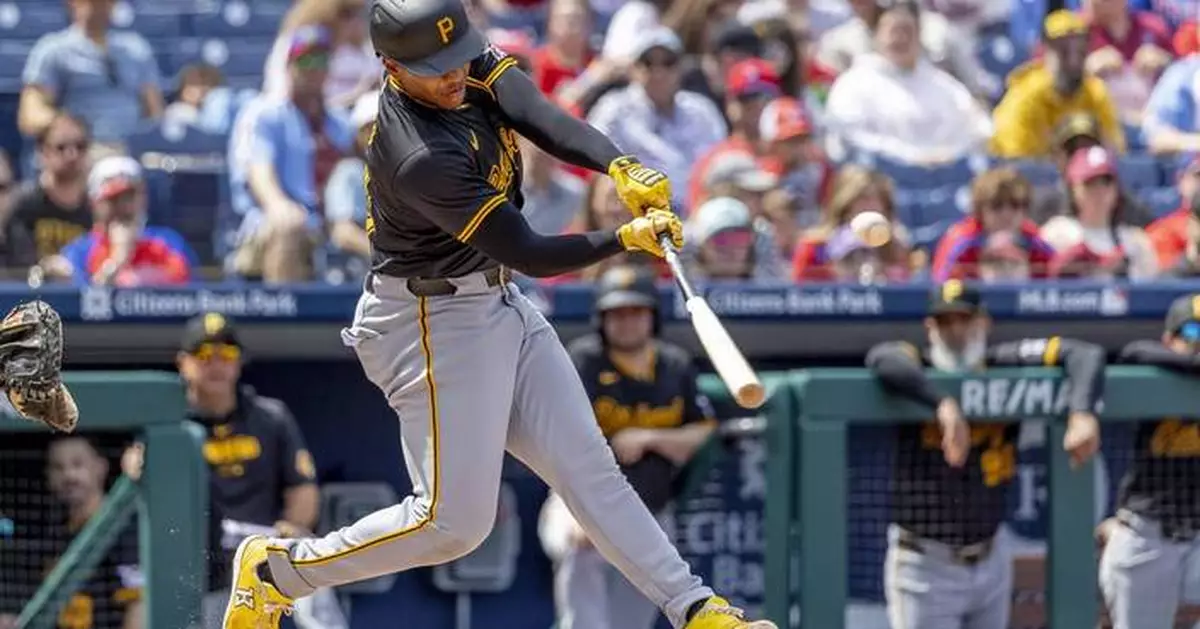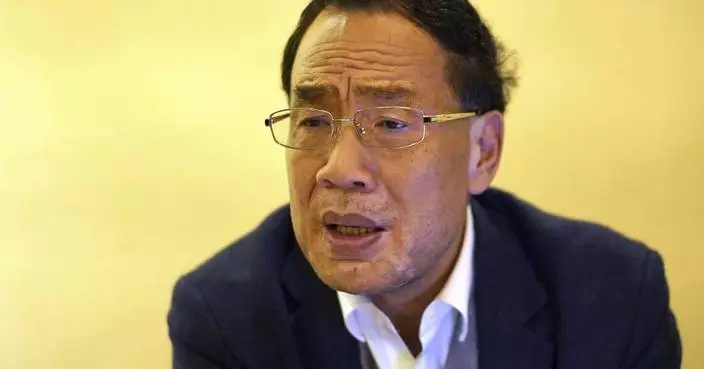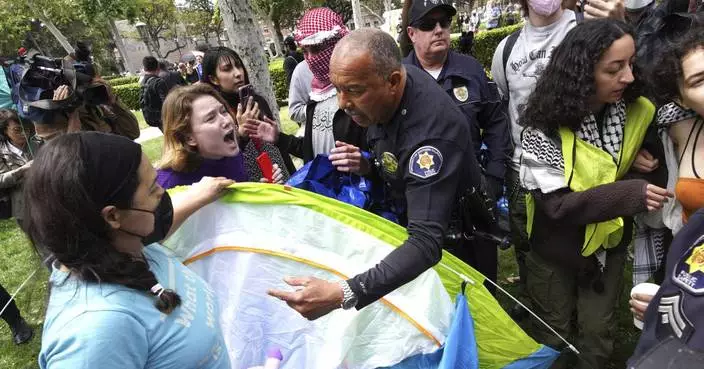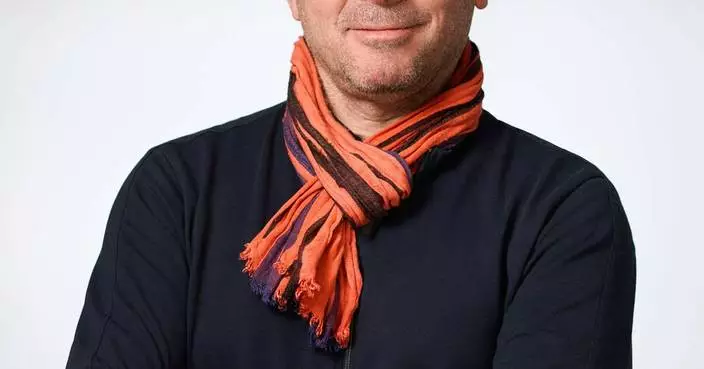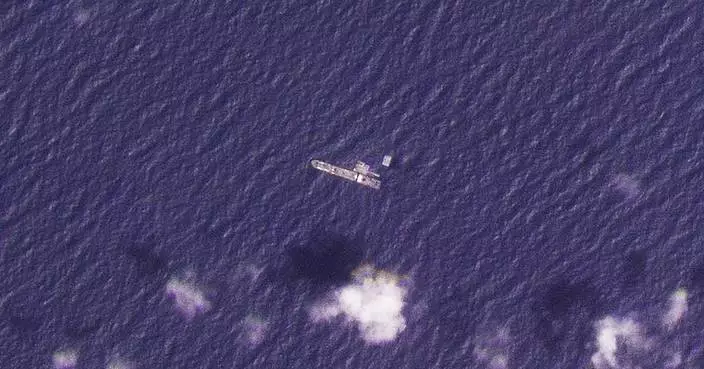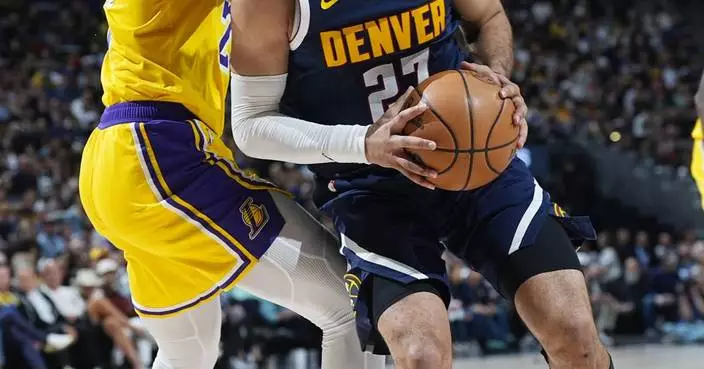NEW YORK (AP) — Gold Glove third baseman Ke'Bryan Hayes was scratched from the Pittsburgh Pirates' lineup Tuesday night against the New York Mets because of tightness in his lower back.
“It just kind of locked up on him a little bit trying to work out. He couldn't get it really to release, so just out of the abundance of caution just going to make sure that we keep him down," manager Derek Shelton said.
Jared Triolo shifted from second base to third and moved from sixth in the batting order to Hayes' spot at No. 3.
Oneil Cruz, who had been scheduled for a night off against left-hander Jose Quintana, was inserted at shortstop. Alika Williams moved from shortstop to second base.
Hayes began the day batting .277 with no homers and seven RBIs.
In other injury-related news, Yasmani Grandal (left foot plantar fasciitis) was set to begin a rehab assignment Tuesday night with Triple-A Indianapolis. The 35-year-old catcher was expected to play four or five innings, Shelton said, but there's still no timetable for his return.
“As we kind of build up, we’ll have to go from there,” Shelton said. “He really has had no spring training, so we’ve got to make sure we get a spring training aspect there.”
Grandal, a two-time All-Star, is waiting to make his Pirates debut. He signed a $2.5 million, one-year contract in mid-February after spending the previous four seasons with the Chicago White Sox.
“We’ve been able to do everything with him. He’s been catching. He’s been getting at-bats off the machine. But he hasn’t played in a game,” Shelton said. “So we just need to get the game in. We need to get running in. We need to get him on the bases as much as possible.”
AP MLB: https://apnews.com/hub/mlb
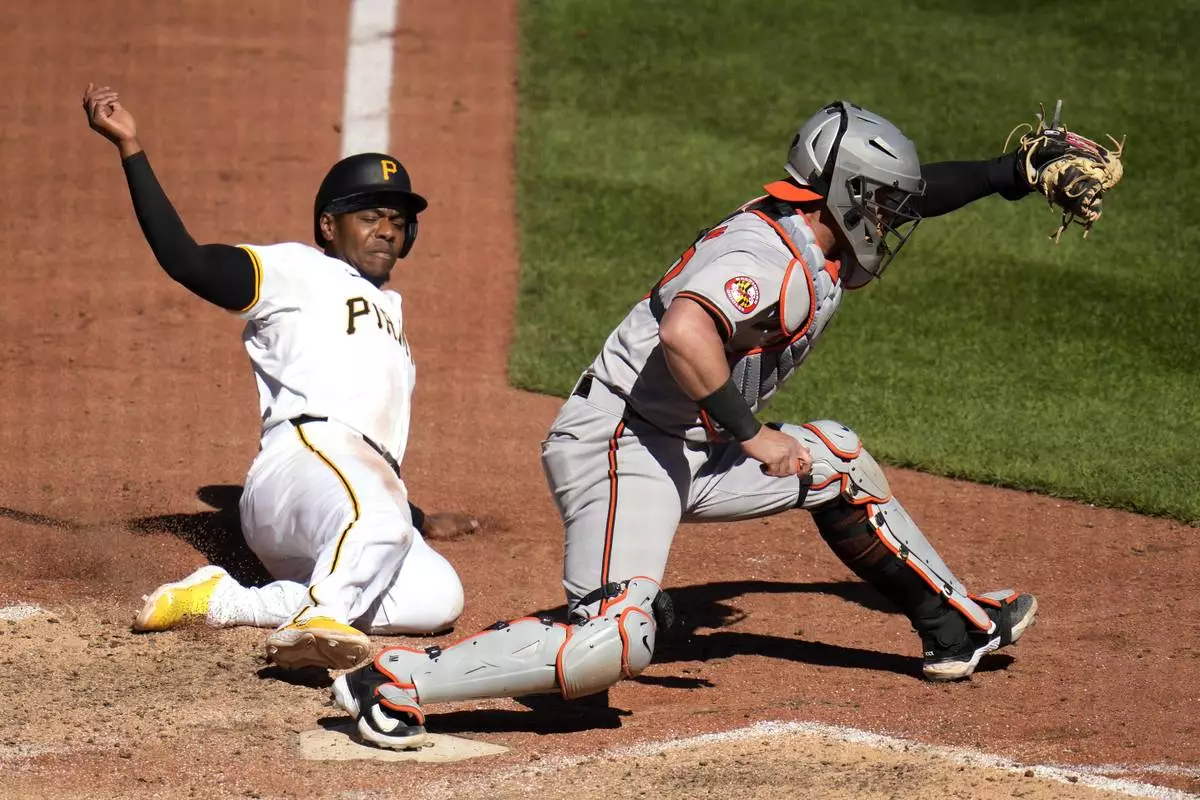
Pittsburgh Pirates' Ke'Bryan Hayes, left, is forced out at home by Baltimore Orioles catcher James McCann on a bases loaded fielder's choice by Rowdy Tellez during the bottom of the ninth inning of a baseball game in Pittsburgh, Sunday, April 7, 2024. The Pirates won 3-2. (AP Photo/Gene J. Puskar)
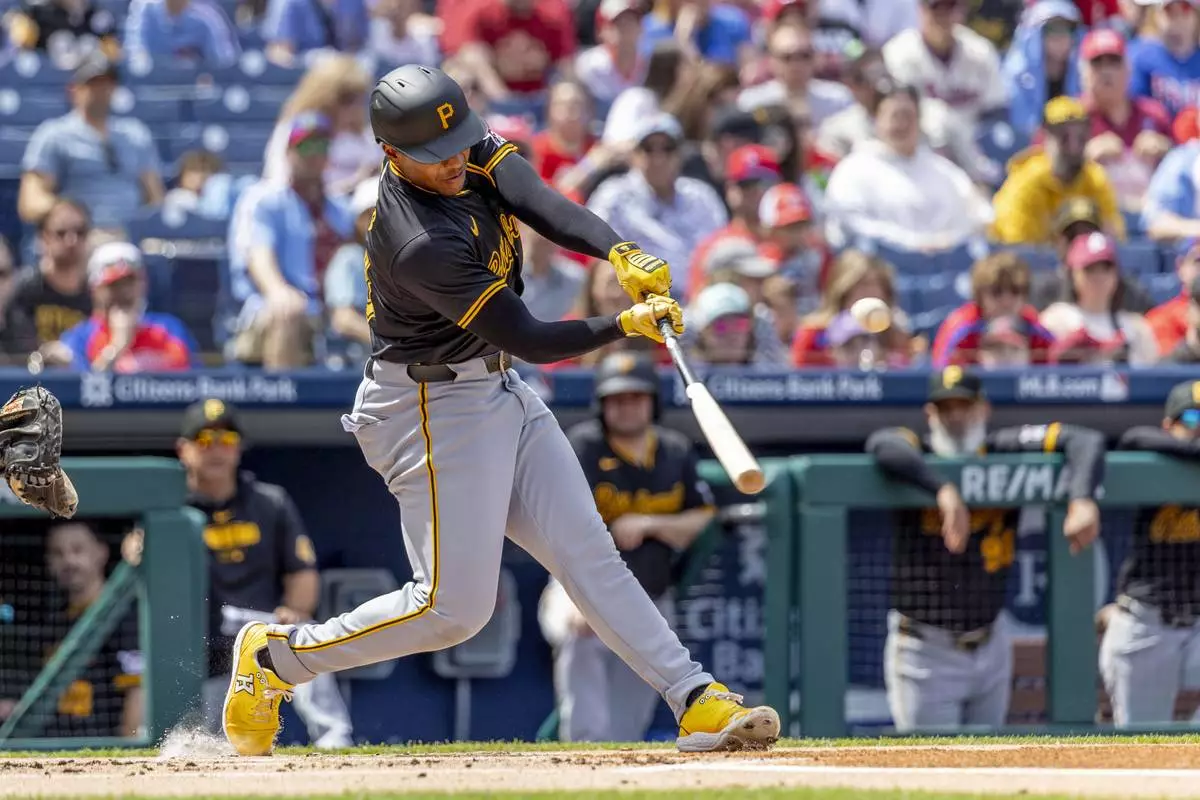
Pittsburgh Pirates' Ke'Bryan Hayes hits a single during the first inning of a baseball game against the Philadelphia Phillies, Sunday, April 14, 2024, in Philadelphia. (AP Photo/Laurence Kesterson)
OTTAWA, Ontario (AP) — Nations made progress on a treaty to end plastic pollution as their fourth round of talks finished early Tuesday in Canada.
For the first time in the process, negotiators discussed the text of what is supposed to become a global treaty. Delegates and observers at the Intergovernmental Negotiating Committee on Plastic Pollution called it a welcome sign that talk shifted from ideas to treaty language at this fourth of five scheduled meetings.
Most contentious is the idea of limiting how much plastic is manufactured. That remains in the text over the strong objections of plastic-producing countries and companies and oil and gas exporters. Most plastic is made from fossil fuels and chemicals.
As the Ottawa session ended, the committee agreed to keep working on the treaty before its final meeting later this year in South Korea.
The preparations for that session will focus on how to finance the implementation of the treaty, assess the chemicals of concern in plastic products and look at product design. Rwanda’s representative said they ignored the elephant in the room by not addressing plastic production.
Stewart Harris, an industry spokesperson with the International Council of Chemical Associations, said the members want a treaty that focuses on recycling plastic and reuse, sometimes referred to as “circularity.”
They don't want a cap on plastic production, and think chemicals should not be regulated through this agreement. Harris said the association is pleased to see governments coming together and agreeing to complete additional work, especially on financing and plastic product design.
Dozens of scientists from the Scientists’ Coalition for an Effective Plastics Treaty came to the meeting to provide scientific evidence on plastic pollution to negotiators, in part, they said, to dispel misinformation.
“I heard yesterday that there’s no data on microplastics, which is verifiably false: 21,000 publications on micro and nanoplastics have been published,” said Bethanie Carney Almroth, an ecotoxicology professor at Sweden's University of Gothenburg who co-leads the coalition. “It’s like Whac-A-Mole.”
She said scientists were being harassed and intimidated by lobbyists and she reported to the U.N. that a lobbyist yelled in her face at a meeting.
Despite their differences, the countries represented share a common vision to move forward in the treaty process, Ecuador's chief negotiator, Walter Schuldt, said.
“Because at the end of the day, we’re talking about the survival of the future of life, not only of human life but all sorts of life on this planet,” he said in an interview.
He said he was proud to participate, to contribute his “grain of sand” to global action to address an environmental crisis.
The treaty talks began in Uruguay in December 2022 after Rwanda and Peru proposed the resolution that launched the process in March 2022. Progress was slow during Paris talks in May 2023 and in Nairobi in November as countries debated rules for the process.
When thousands of negotiators and observers arrived in Ottawa, Luis Vayas Valdivieso, the committee chair from Ecuador, reminded them of their purpose to deliver a future free of plastic pollution. He asked them to be ambitious.
The delegates have been discussing not only the scope of the treaty, but chemicals of concern, problematic and avoidable plastics, product design, and financing and implementation.
Delegates also streamlined the unwieldy collection of options that emerged from the last meeting.
“We took a major step forward after two years of lots of discussion. Now we have text to negotiate,” said Björn Beeler, international coordinator for the International Pollutants Elimination Network. “Unfortunately, much more political will is needed to address the out of control escalating plastic production.”
Many traveled to Ottawa from communities affected by plastic manufacturing and pollution. Louisiana and Texas residents who live near petrochemical plants and refineries handed out postcards aimed at the U.S. State Department saying, “Wish you were here."
They traveled together as a group from the Break Free From Plastic movement, and asked negotiators to visit their states to experience the air and water pollution firsthand.
“This is still the best option we have to see change in our communities. They’re so captured by corporations. I can't go to the parish government,” said Jo Banner, of the St. John the Baptist Parish in Louisiana. “It feels this is the only chance and hope I have of helping my community repair from this, to heal.”
Members of an Indigenous Peoples’ Caucus held a news conference Saturday to say microplastics are contaminating their food supply and the pollution threatens their communities and ways of life guaranteed to them in perpetuity. They felt their voices weren’t being heard.
“We have bigger stakes. These are our ancestral lands that are being polluted with plastic,” Juressa Lee of New Zealand said after the event. “We’re rightsholders, not stakeholders. We should have more space to speak and make decisions than the people causing the problem.”
In the Bay of Plenty, a source of seafood on New Zealand's northern coast, the sediment and shellfish are full of tiny plastic particles. They regard nature's “resources” as treasures, Lee added.
“Indigenous ways can lead the way," Lee said. "What we're doing now clearly is not working.”
Vi Waghiyi traveled from Alaska to represent Arctic Indigenous peoples. She's reminding decision-makers that this treaty must protect people from plastic pollution for generations to come.
She said, “We come here to be the conscience, to ensure they make the right decision for all people.”
The Associated Press’ climate and environmental coverage receives financial support from multiple private foundations. AP is solely responsible for all content. Find AP’s standards for working with philanthropies, a list of supporters and funded coverage areas at AP.org.

FILE - A sign sits amongst plastic on a public art installation outside a United Nations conference on plastics on April 23, 2024, in Ottawa, Ontario. (Adrian Wyld/The Canadian Press via AP, File)
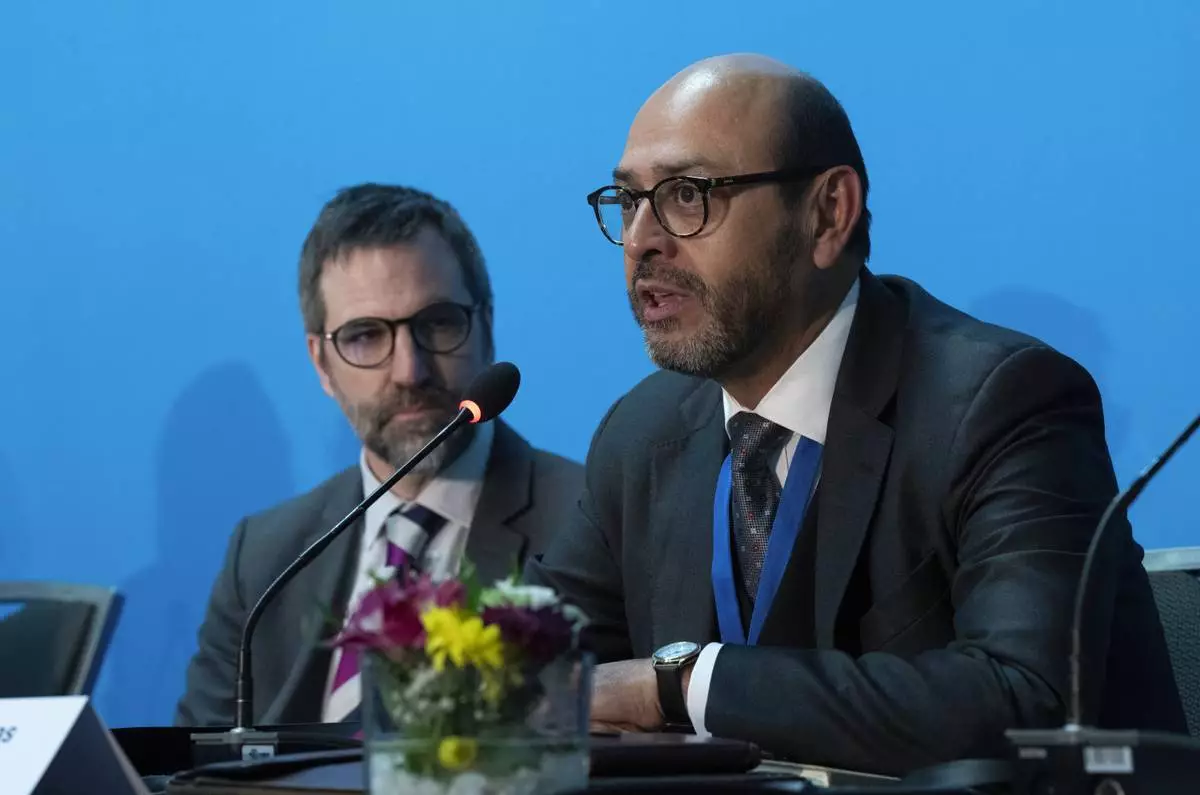
FILE - Minister of Environment and Climate Change Steven Guilbeault looks on as Chairperson of the Intergovernmental Negotiating Committee Ambassador Luis Vayas Valdivieso speaks during a news conference, April 23, 2024, in Ottawa, Ontario. (Adrian Wyld/The Canadian Press via AP, File)
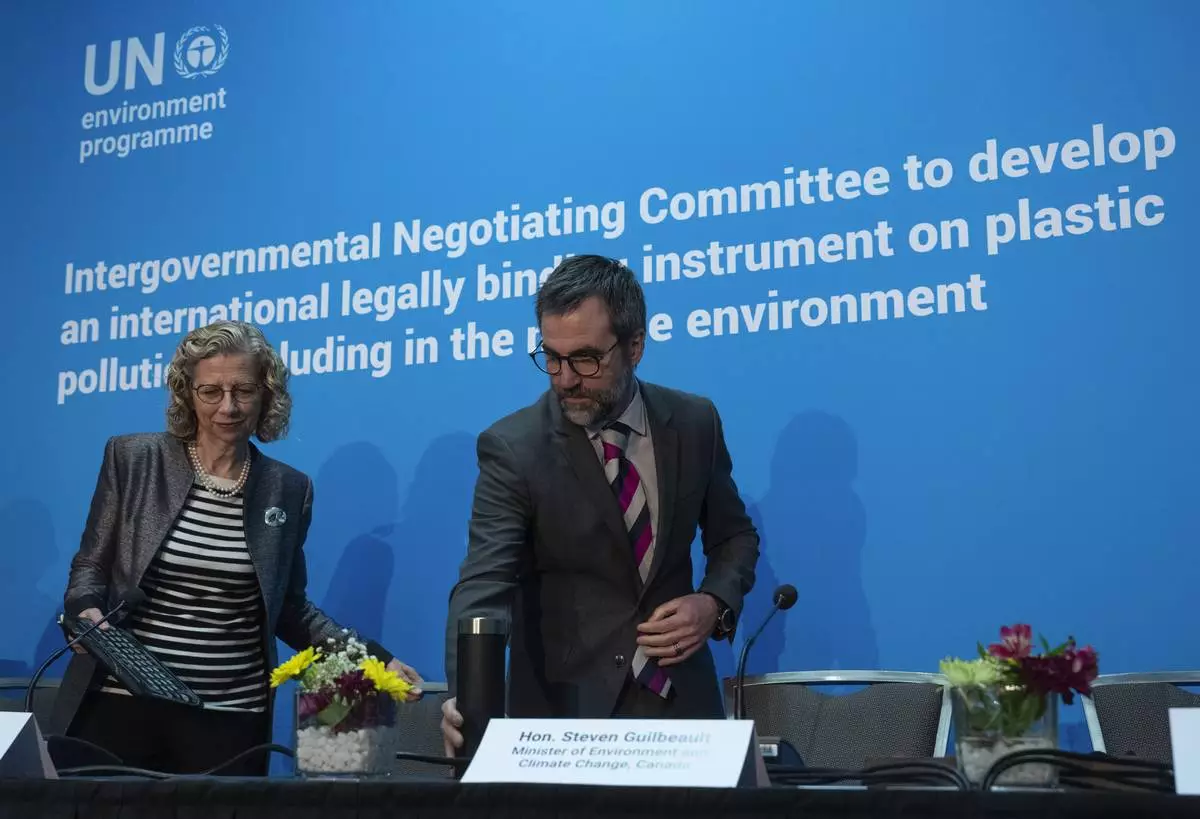
FILE - United Nations Environment Programme Executive Director Inger Andersen and Environment and Climate Change Minister Steven Guilbeault take their seats at a news conference, April 23, 2024 in Ottawa, Ontario. (Adrian Wyld/The Canadian Press via AP, File)
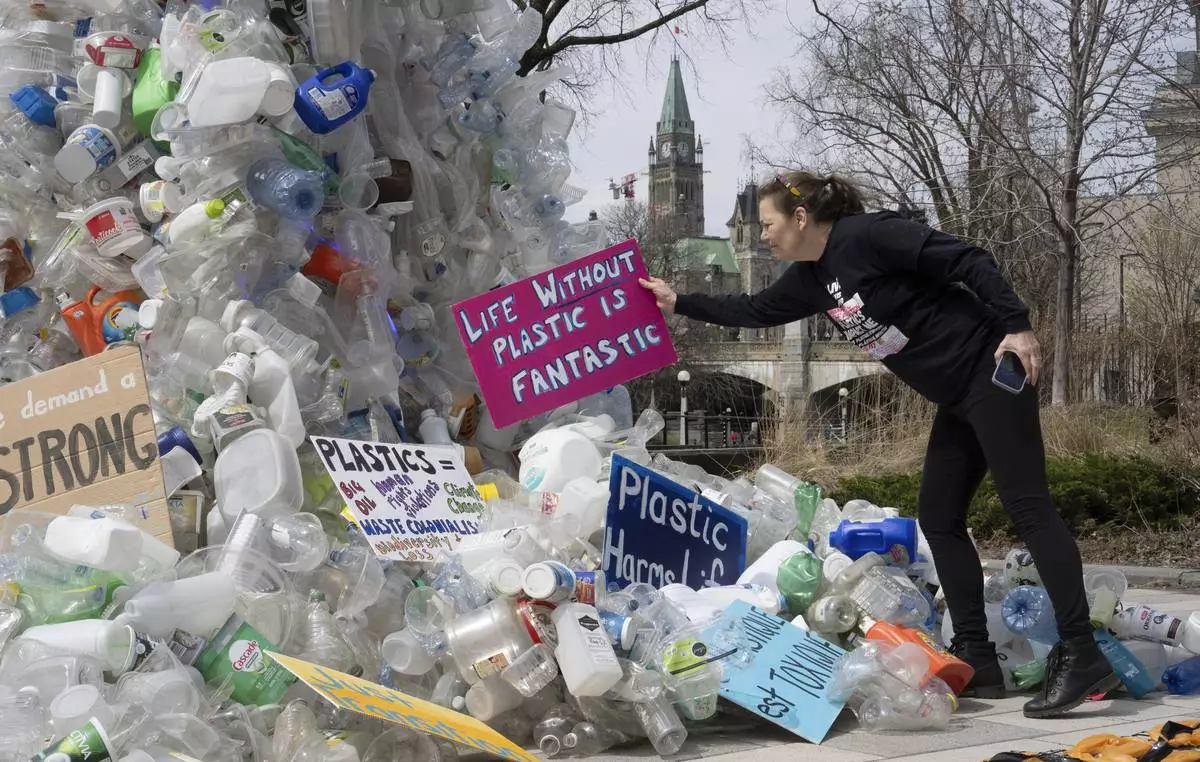
FILE - Activist Dianne Peterson places a sign on an art installation outside a United Nations conference on plastics, April 23, 2024, in Ottawa, Ontario. (Adrian Wyld/The Canadian Press via AP. File)




